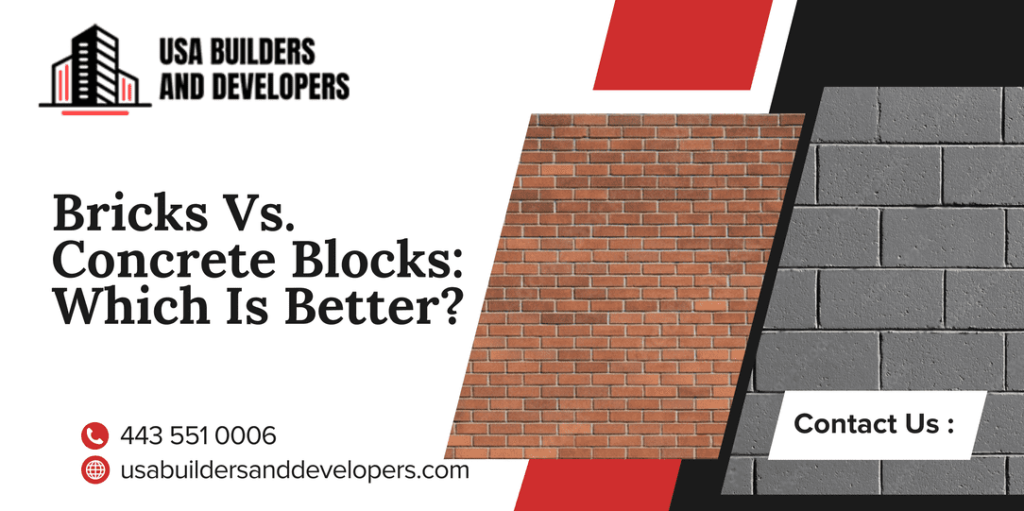When constructing a building, choosing the right material is crucial for durability, cost-efficiency, and aesthetics. Two of the most common materials are bricks and concrete blocks. Each has its own set of advantages and drawbacks, making the decision largely dependent on your project’s specific needs. Whether you’re using bricks for their classic appeal or concrete block for their strength, professional masonry services ensure quality and precision throughout the construction process.
What Are Bricks?
Bricks are small, rectangular blocks made from clay or similar materials. They’ve been used for centuries to build homes, schools, and other buildings. Bricks are strong and dependable. You’ll often see them in older buildings or places with a classic style.
Advantages of Bricks
- Durability
Bricks are highly durable and weather-resistant, making them ideal for both residential and commercial projects. - Aesthetics
Their timeless, natural appearance enhances the visual appeal of buildings. - Thermal Insulation
Bricks provide excellent thermal insulation, keeping buildings cooler in summer and warmer in winter. - Low Maintenance
Brick walls require minimal maintenance and are resistant to pests like termites.
Disadvantages of Bricks
- Higher Cost
Bricks are often more expensive than concrete block due to the manufacturing process. - Heavier Weight
Bricks are heavier, which can make construction more labor-intensive and time-consuming. - Size Limitation
Bricks are smaller in size, which increases the number needed for a project.
Understanding Concrete Blocks
Concrete blocks, also known as concrete masonry units (CMUs), are larger, rectangular blocks made from a mixture of cement, sand, and aggregate. They are commonly used for modern construction projects.
Advantages of Concrete Blocks
- Cost-Efficiency
Concrete blocks are generally more affordable, especially for large-scale projects. - Larger Size
Their larger size means fewer blocks are needed, reducing construction time and labor costs. - Versatility
Concrete blocks can be reinforced with steel for additional strength, making them suitable for multi-story structures. - Better Soundproofing
Concrete blocks offer superior sound insulation, ideal for buildings in noisy areas. - Fire Resistance
Like bricks, concrete block are fire-resistant, ensuring safety.
Disadvantages of Concrete Blocks
- Less Aesthetic Appeal
Concrete block lack the natural charm of bricks and may require additional finishing, like plastering or painting. - Lower Thermal Insulation
They are less effective at regulating temperature compared to bricks. - Moisture Absorption
Concrete blocks are more prone to absorbing water, which can lead to dampness if not properly treated.
Bricks vs. Concrete Blocks: A Comparison
| Feature | Bricks | Concrete Blocks |
|---|---|---|
| Cost | Higher | Lower |
| Size | Small | Large |
| Durability | Very strong | Strong with reinforcement |
| Look | Natural, warm | Plain, needs finishing |
| Thermal Insulation | Excellent | Moderate |
| Construction Speed | Slower | Faster |
Which One Should You Choose?
The choice between brick and concrete blocks depends on your priorities:
- For Aesthetics and Durability: Choose bricks if you prioritize appearance and long-term resilience.
- For Cost and Efficiency: Concrete blocks are better for larger projects and faster construction timelines.
- For Thermal Comfort: Bricks offer better temperature regulation, making them ideal for residential projects.
- For Modern Structures: Concrete blocks are versatile and work well for multi-story buildings and industrial constructions.
FAQs About Bricks vs. Concrete Blocks
Concrete blocks are generally stronger than traditional bricks due to their higher compressive strength and durability. This makes them ideal for large-scale and load-bearing construction.
Yes, bricks are typically more expensive than concrete blocks. Concrete blocks are cost-effective due to their larger size, which reduces the number of units and labor needed.
Concrete blocks are better for modern home construction because they offer improved insulation, faster installation, and better structural strength compared to bricks.
Both bricks and concrete blocks are durable, but bricks have a longer lifespan in some environments due to their resistance to moisture and weathering.
Bricks are made from clay and fired in a kiln, while concrete blocks are made from a cement and aggregate mixture. Concrete blocks are larger, lighter, and faster to install than traditional bricks.
Final Thoughts
Both brick and concrete blocks have unique strengths, and the best choice depends on your specific project needs. Whether you value tradition or efficiency, understanding the pros and cons of each material ensures you make an informed decision.
Have Questions? Call Us Now!
We’re here to help—quick answers, friendly service, anytime you need!

